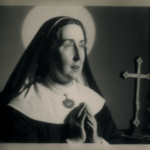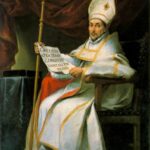St. Paschal
St. Paschal
When they lived: Saint Paschal Baylon lived during the late 16th century, specifically from May 24, 1540, to May 17, 1592.
Where they lived: Saint Paschal was born in Torrehermosa, a small village in the Kingdom of Aragon, which is now part of Spain. He spent most of his life in the region of Valencia.
Notable world events during the time of their life:
- Scientific Revolution Begins (1543): Copernicus publishes his groundbreaking work “De revolutionibus orbium coelestium,” challenging the prevailing geocentric model of the universe and laying the foundation for modern astronomy.
- Spanish Armada (1588): The Spanish Armada, a fleet of ships sent by King Philip II of Spain, attempts to invade England but is defeated by the English navy. This event marks a significant shift in the balance of power in Europe.
- Battle of Lepanto (1571): The naval Battle of Lepanto takes place, where the Holy League, led by the Papal States and various Catholic maritime states, defeats the Ottoman Empire, preventing its further expansion into Europe.
- Elizabethan Era (1558-1603): The reign of Queen Elizabeth I of England sees a flourishing of arts, exploration, and literature, including the works of William Shakespeare, which continue to impact culture to this day.
- Treaty of Tordesillas (1494): Although this event predates Paschal’s life, its consequences shape the era. The treaty divides newly discovered lands outside Europe between Portugal and Spain, leading to European colonization of the Americas.
- First Permanent English Settlement in America (1607): Jamestown, the first permanent English settlement in the Americas, is established in what is now the state of Virginia, marking the beginning of the colonization of North America.
Their patronage: Saint Paschal Baylon is the patron saint of Eucharistic congresses and Eucharistic associations. He is revered for his deep devotion to the Eucharist and his unwavering faith in the real presence of Christ in the Blessed Sacrament. His life story is an inspiring testament to the transformative power of faith and the importance of spiritual communion with the divine.
Early Life
Paschal Baylon was born at Torrehermosa in the Kingdom of Aragon in Spain on May 16, 1540. It was the day of the Feast of Pentecost, and for this reason, his parents named him Paschal. His parents, Martin Baylon and Elizabeth Jubera, were not particularly wealthy individuals.
Early Childhood
He worked as a shepherd from the age of 7 until the age of 24. His life of mortification began when he was a shepherd. He prayed while on duty, and he was attentive to the church bell that rang at the elevation during Mass. He was an extremely honest and responsible young man. When his animals damaged crops in the fields, he took full responsibility and offered to pay the owners damages.
To fight illiteracy, he carried a book when he went to the fields where he looked after sheep. He asked people that he met to teach him how to read the letters in the book. Due to this dedication, Paschal was able to read at a very tender age.
Despite being poor himself, Paschal always helped other poor people wherever he could. At some point, he would give away part of his dinner to the poor. His pious nature influenced people to adore and respect him. He was also an individual with high levels of respect for those he came across.
In 1564, Paschal joined the Friars Minor and went into a life of penance wholeheartedly. He turned down the opportunity to study for the priesthood because he felt that it was not his path. He chose to be a brother instead.
He did not like comfort, and as a result, he wore a coat with steel spikes or a tunic lined with rough pig hair designed to cause discomfort. He walked barefoot in the snow and on the roughest roads. He also slept outside in the cold, occasionally. He adapted to all places and seasons. He was always content and cheerful.
Lifestyle
He was a cook, porter, gardener, and official beggar who went around asking for alms. He lived his life in contemplation and meditation all the time, even at work. He never wasted food. He preferred eating leftovers from the kitchen. At the end of each week, he ate a few boiled vegetables soaked in water with wormwood.
He was a devoted Christian who spent nights at the altar to commune with God through meditation on faith. In 1576, he was sent to France to defend the Real Presence against the opinions of Calvinist preachers. As he was preaching, he was despised, and the Huguenot mob wanted to kill him. They chased him away, throwing stones and dirt at him. He suffered a broken shoulder and bruises.
Date of Death
Paschal fell ill and died on May 17, 1592, at the age of 52. He was buried in Villarreal, where his tomb became a place of pilgrimage where miracles were performed. In 1730, an indigenous Guatemalan claimed to have seen Saint Paschal appear as a skeleton in robes. This event became the basis of the heterodox tradition of San Pascualito.
Pope Paul V beatified Paschal on October 29, 1618, and Pope Alexander VIII canonized Paschal as a saint on October 16, 1690. Today, he is celebrated annually by Catholics.
Patronage
Pope Leo XIII proclaimed the Saint as the seraph of the Eucharist and patron of Eucharistic Congresses and affiliated associations. Pope John XXIII named the Saint as the patron saint of the Sergobe diocese on May 12, 1961.
5 Interesting Facts About St. Paschal
- His tomb at Villareal was a source of many miracles, and it became a
place of pilgrimage.
3. Art often depicts him wearing the Franciscan habit and bearing a
monstrance to signify his devotion to the Holy Eucharist. - St. Paschal’s grave was desecrated, and anti-clerical leftists had
His relics burned during the Red Terror at the time of the Spanish Civil War.
War.
5. In 1730, an indigenous Guatemalan claimed to have seen Saint Paschal.
appearing as a skeleton in robes. That was the beginning of the
heterodox tradition of San Pascualito.
Prayer to St. Paschal
I desire to love you, my Lord, my light, my strength, my deliverer, my God, and my All. What have I in heaven, O Lord,and what do I want besides your love and grace? You are the God of my heart; you are my portion and my inheritance for eternity. Amen. (A Prayer of St. Paschal) St. Paschal, you were filled by the Holy Spirit with a wondrous love for the sacred mysteries of Christ’s Body and Blood. Intercede for us now that we may obtain the grace of profound faith and tender devotion for Jesus in the Most Blessed Sacrament. May we draw from the Eucharist the same spiritual riches you received with great joy, and may our lives reveal the enduring fruit of love, generosity, and goodness to the glory of God our Father. St. Paschal Baylon, lover of the Eucharist, pray for us. Amen.



